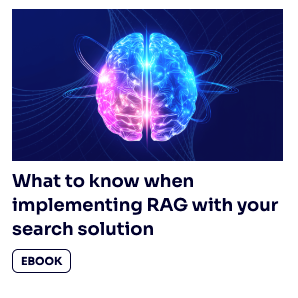Here at Algolia, we’ve been working hard to bring you the best of the best, industry-leading search and discovery tools for almost thirteen years. Part of our mission is to always provide our clients with more value tomorrow than we did yesterday, so in that spirit we’ve been working with some of the world’s leading search experts, pioneering developments in AI, and implementing feedback from forward-thinking users. After years of refinement, we arrived at NeuralSearch, the balanced hybrid keyword- and vector- search algorithm that’s now powering 30 billion searches every week.
Let’s cut through the fluff — why is NeuralSearch better? Here are 10 reasons.
1. Customers use niche language. NeuralSearch gets it.
When a new mother searches for cleaning products that are “baby-safe”, she wouldn’t get many results with other search engines because that’s such a specific, niche word that it likely isn’t included in product descriptions. NeuralSearch knows she’s referring to non-toxic cleaning products though, and has enough intuition to match her query to products she’d feel comfortable using around her newborn.
2 Customers search by vibe. NeuralSearch gets it.
No college kid on spring break sits down to make a checklist of all the products they’ll need to bring with them on their beach trip — they just open up the app of their favorite ecommerce store and search “beach vacation essentials”. They’re expecting to see sunscreen, swimwear, flip-flops, beach towels, and maybe even a good romance novel if they’ve bought a few in the past. NeuralSearch can recognize thematic relationships (aka vibes) that queries and products share, even without having keywords in common, and even across the typical category boundaries (clothing, linens, books, etc.). With a little personalization sprinkled in, that student’s getting less of a headache and more of a tan.
3. Customers search by purpose. NeuralSearch gets it.
The family is getting together again and Brandon wants to get a gift for his dad, but he doesn’t know what to get. Luckily, he just has to know his dad’s interest, and NeuralSearch will just know what he’s looking for when he searches “Looking for a gift for someone who loves cooking”. Using the data you give it from previous searches and checkout flows, NeuralSearch works with Algolia Advanced Personalization to even prioritize items that have been bought before as gifts. Dad’s going to love those grill presses.
4. Customers speak naturally. NeuralSearch gets it.
Algolia’s NeuralSearch matches the underlying essence of the search query to results, meaning that queries like “I need something to keep drinks cold for camping” will work just fine. Gone are the days when to find something on the Internet, we had to craft the perfect search query or else nothing would appear. Many of us are still trained to use awkward queries just so the search engine understands, like “x near me” or “x meaning” instead of “where is the nearest x?” or “what does x mean?”.
5. Customers are ambiguous. NeuralSearch gets it.
Humans run on context — if you ask your grocer for an apple, nobody would expect them to hand you a MacBook. Computers usually don’t do well with ambiguity though — if you have both apples and Apples in your product database (like say, Walmart does) then you’d usually be left hanging. NeuralSearch, however, represents a new frontier in search, one where context and history gets folded into the search algorithm. Based on the types of products in the database and intuition about user behavior, NeuralSearch can sift through the options and find what the user is looking for with surprising accuracy.
6. Customers put attributes in their queries. NeuralSearch gets it.
A new small business owner doesn’t have a lot of initial capital to spend, so most of the day-one supplies they’ll be searching for will include the word “budget-friendly”. Although it's ambiguous, for NeuralSearch, that's ok. If there are any keywords or phrases in the product description, metadata, or customer reviews (or any data that's accessible to NeuralSearch), it will understand those terms to deliver results that match the user's intent. Encourage your customers to use descriptive language in the search box, and NeuralSearch will know what to do.
7. Customers misspell. NeuralSearch gets it.
How many times have you heard someone ask for “expreso” at a café? If that’s how they say it out loud, how do you think they’ll spell it when they search for ground espresso beans on your grocery website? You want to connect them to the right product (even upsell them, if you can), but all that requires understanding what they meant. NeuralSearch is resilient to typical and even ridiculous misspellings that go beyond the everyday slip of the fingertip.
8. Sometimes you need to be a team player. NeuralSearch gets it.
NeuralSearch is one core technology for understanding search intent. It works in conjunction with other search technologies to deliver outstanding results. For example, as kids go back to school, parents are going to be looking for back to school supplies. If they search for backpacks, AI Ranking will boost "backpack" results as their popularity changes to display the right kinds of backpacks. Another example: it also works with Advanced Personalization to improve results from previous search histories which might include brand preferences.
9. Customers use slang. NeuralSearch gets it.
Especially with modern slang evolving out of social media platforms like TikTok, understanding what new words mean in context is crucial if we are trying to sell to chronically online customers. For example, expect Gen Z to search for “aesthetic room decor” or clothing trends like “coquette” or “cottagecore”.
10. You want to grow revenue. NeuralSearch does it.
It's estimated that 70-80% of the queries on a product catalog are in the long tail. Historically, ecommerce businesses would write rules to help search engines understand what users are looking for. For example, you could write a rule that a query containing the keywords “coffee or espresso”, “machine”, and “milk” all mean the same thing as “espresso machine with steam wand.” That's hard. The problem is that you won’t be able to cover every edge case for every possible long tail query. With NeuralSearch, you don't need to write rules anymore. It understands that a "machine with milk frother" probably means the same thing as an espresso machine to deliver the best results for your customers and grow long tail revenue.
What's next?
Don't just take our word for it. NeuralSearch is a revolution in search technology! Contact our team today with the button at the bottom right to try NeuralSearch to see for yourself.











